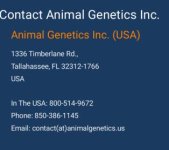Sybilestial
New member
If anyone knows of any locations of facilities that can do certified dna tests for leopard geckos in America, please let me know. Anywhere near California would be better.
Several reasons to get a gecko tested: Enigma syndrome, exact morphs, if you get it from a pet store, etc. Example; Is the gecko albino? You don't want to mix albinos - including hets- as then you can't really distinguish them anymore. (Though that is mostly for selling them as breeders.) Plus, again, if it has the enigma syndrome trait, I would NOT want to breed them for babies to possibly have that problem. (Which I know some never show symptoms.) I'd rather not go through test breeding just to confirm what said geckos traits would be.
I just want to be as careful as possible since it'll be a while before I do decide to breed. Less stress for the gecko, no "unwanted" baby geckos from test breeding (I would care for them until they find homes of course), and not flooding the impurity of gecko morphs as it is. Same as for the health of the breeding geckos and their offspring.
Several reasons to get a gecko tested: Enigma syndrome, exact morphs, if you get it from a pet store, etc. Example; Is the gecko albino? You don't want to mix albinos - including hets- as then you can't really distinguish them anymore. (Though that is mostly for selling them as breeders.) Plus, again, if it has the enigma syndrome trait, I would NOT want to breed them for babies to possibly have that problem. (Which I know some never show symptoms.) I'd rather not go through test breeding just to confirm what said geckos traits would be.
I just want to be as careful as possible since it'll be a while before I do decide to breed. Less stress for the gecko, no "unwanted" baby geckos from test breeding (I would care for them until they find homes of course), and not flooding the impurity of gecko morphs as it is. Same as for the health of the breeding geckos and their offspring.


